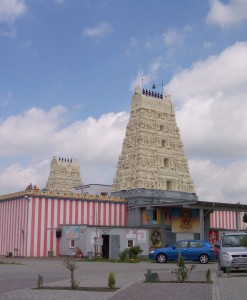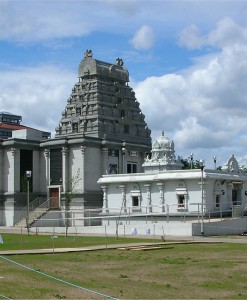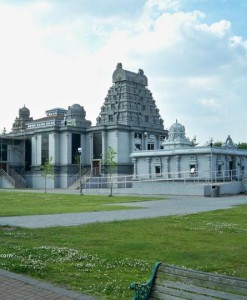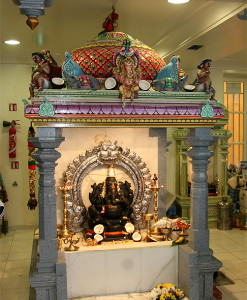No products in the cart.
The International Society for Krishna Consciousness (ISKCON) is a branch of the monotheistic Gaudiya Vaishnava tradition dating back 5000 years to Lord Krishna Himself. ISKCON was established in the West in 1966 by His Divine Grace A.C. Bhaktivedanta Swami Prabhupada (Srila Prabhupada) and has since developed into a worldwide confederation of over 500 temples, centers, communities, schools, and restaurants with some 250,000 devotees.
The mission of this nonsectarian, monotheistic movement is to promote the well-being of society by teaching the science of Krishna consciousness according to Bhagavad-gita and other ancient scriptures.
ISKCON Zurich(Hare Krishna Temple)
In 1980 decided the young Swiss Krishna devotees to open a temple in Zurich. Through a series of fortunate circumstances they were able to acquire an older and at that time quite dilapidated villa on the mountain road 54 in Zurich in spring 1980th
This central temple offered to Krishna devotees accommodate a larger temple community and also new ways to offer lectures and events, as well as the now traditional Sunday Feast perform in an expanded framework. Thereby the number of members, and the Krishna temple on the mountain road in Zurich enlarged within a few years was soon to a city known address.
The development of the Krishna religion in Switzerland has seen different phases. Goods initially mainly the few temples and farm communities as Krishna conscious centers dominant, so today arise more and more small centers and private venues. The temple evolve in this way to training centers, where interested people are offered the opportunity to experience the diversity and depth of the Vedic culture and philosophy in order then to integrate them into their personal and professional lives.
The growth of the community is the sign of a healthy development, because in every society lives only the smallest part of the population in a monastery, temple communities. The “Society for Krishna Consciousness” will likely increasingly accept this form in future, for Krishna Consciousness (God-consciousness) is not limited to monks, nuns or priests, but can be deployed everywhere and by all people: regardless of gender, age, profession or denomination.
This is the universal message of Krishna religion, and on this basis, the members and friends of ISKCON hope (International Society for Krishna Consciousness), that they too can contribute to the cultural and spiritual diversity in Switzerland. Respect, tolerance and open-mindedness are indispensable factors of constructive coexistence between people and religions; precisely in this relationship the Krishna religion could with its universal message may provide their valuable services.
Address:
Krishna Community Switzerland
Bergstrasse 54
8032 Zurich
Zürich Stadelhofen is the nearest rail head present. Zurich Airport is the nearest airport present.
Timings: 4:00AM to 9.00PM
4:30 Mangala-arati (auspicious morning ceremony), the first service in the morning
05:15 Japa: chanting the Hare Krishna Maha-mantra. The Krishna devotees in the temple
chant ( “sing”, reciting) sixteen rounds on a wooden bead necklace, which is about 1 ½
takes up hours. Between 6:00 and 7:00, some take a
nap.
07:15 Welcoming the Bildgestallten, the curtain of the altar is reopened
(Govinda- devotion), then Guru-puja and kirtana (singing together).
07:45 lecture from the Srimad Bhagavatam, followed by a question and answer portion.The lecture giver alternate daily.
08:45 Morning prasadam. (Breakfast western or Vedic kitchen)
10:00 Practical Devotional service. After breakfast the Krishna devotees go to different activities, such as cleaning the temple, cooking,
shopping, gardening, home repairs, administrative work, etc.
All Krishna devotees to the Vedic also at least one hour per day
studying writings and other relevant literature ,
13:00 midday prasadam. (Mittagsessen- mostly Vedic cuisine; rice, dal, Subji, capatis etc.)
15:00 Individual activities: Reading, personal study, correspondence,
some rest or take a walk. (Japa-walk, walking meditation)
Some devotees go from time to time on harinama-sankirtana.
(Public Singing holy name of God, along with prasadam distribution
or sale of books).
16:30 Small “afternoon snack” with fruit, nuts un fruit.
19:00 Gaura-arati, evening ceremony. The service in the evening; partake of the well again and again guests and friends of Krishna.
19:45 Bhagavat Gita lecture.
20:15 Evening prasadam (Dinner Vedic specialties). Many temples residents
drink only warm milk and retire early back into the room.
21:00 night’s sleep, this time to go to sleep most of Krishna devotees, because the next morning ringing the alarm clock, and a new day in the Krishna consciousness begins.
Visitors are to all parts of the daily program invited to learn about the religious ceremonies, the life of Krishna devotees in the temple, the culinary offerings of Indian vegetarian cuisine as well as the age-old philosophy and literature.
ISKCON MISSION STATEMENT
1. To systematically propagate spiritual knowledge to society at large and to educate all people in the techniques of spiritual life in order to check the imbalance of values in life and to achieve real unity and peace in the world.
2. To propagate a consciousness of Krishna (God), as it is revealed in the great scriptures of India, especially Bhagavad-gita and Srimad-Bhagavatam. We accept the principle of transmigration of the soul (reincarnation).
3. To bring the members of the Society together with each other and nearer to Krishna, the prime entity, thus developing the idea within the members, and humanity at large, that each soul is part and parcel of the quality of Godhead (Krishna).
4. To teach and encourage the sankirtana movement, congregational chanting of the holy name of God, as revealed in the teachings of Lord Sri Caitanya Mahaprabhu.
5. To erect for the members and for society at large a holy place of transcendental pastimes dedicated to the personality of Krishna.*
6. To bring the members closer together for the purpose of teaching a simpler, more natural way of life.
7. With a view towards achieving the aforementioned purposes, to publish and distribute periodicals, magazines, books and other writings that help realize these purposes.








